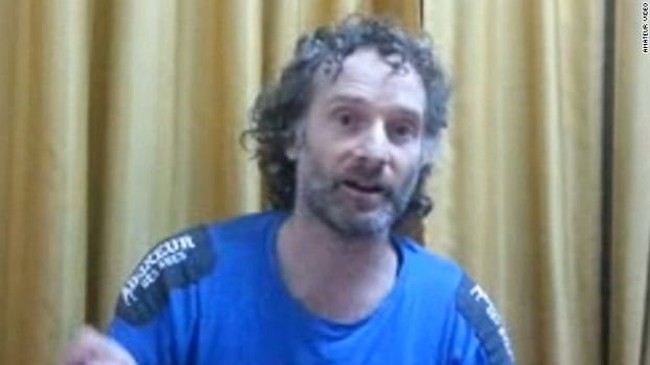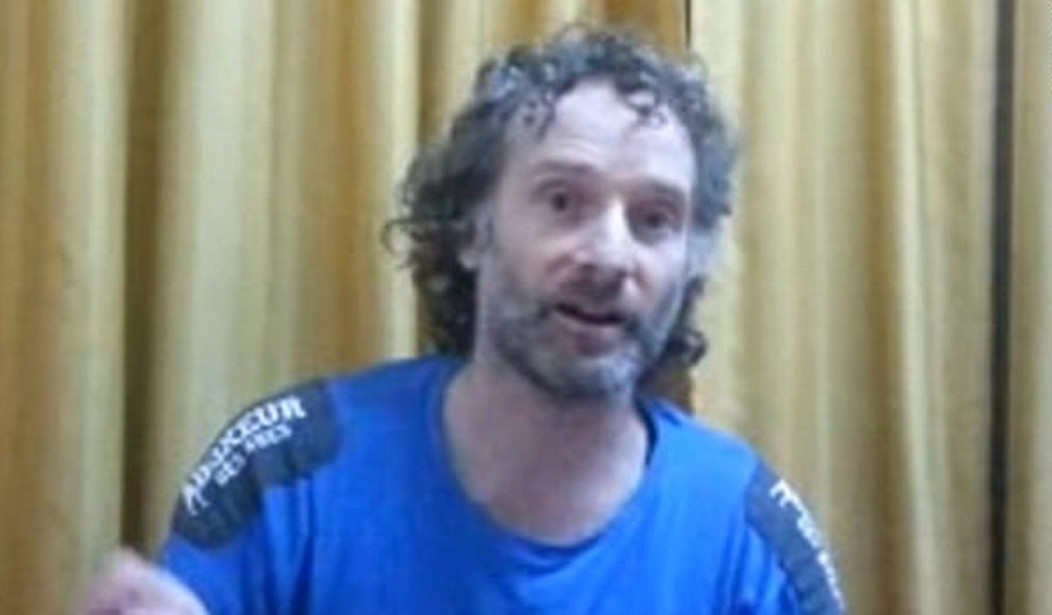 It was a relief when al Qaeda affiliated Syrian rebels belonging to Jabhat Al-Nusrah released American freelance writer Peter Theo Curtis. Curtis has been held captive for nearly two years. Jabhat Al-Nusrah has been designated by the US State Department as an affiliate of al Qaeda in Iraq (AQI), the group founded by Abu Musab al-Zarqawi.
It was a relief when al Qaeda affiliated Syrian rebels belonging to Jabhat Al-Nusrah released American freelance writer Peter Theo Curtis. Curtis has been held captive for nearly two years. Jabhat Al-Nusrah has been designated by the US State Department as an affiliate of al Qaeda in Iraq (AQI), the group founded by Abu Musab al-Zarqawi.
The New York Times hints that Curtis may have been released after payment of a ransom. Undoubtedly, the offer of a ransom has been made in the past so the question is why was he released now.
Curtis was released just a few days after the video of the beheading of photojournalist James Foley by ISIS/ISIL was released. This was probably the critical factor in his release, in addition to whatever ransom was paid.
While ISIS/ISIL have a similiar genesis as the various extremist factions fighting Syrian president Bashar al-Assad and have benefited from the assistance given those groups by sympathetic states (Qatar, Saudi Arabia, Turkey) and the stupid (Obama) the organizations have gone in different directions. ISIS has set its sights on carving out a significant portion of Syria for its “caliphate” and it is treating the various rebel groups, regardless of beliefs and sponsors, as it treats the Syrian arm.
The fate of Syria’s Western-backed opposition hangs on a knife edge in the northern part of the war-torn country — and with radical Sunni militants and regime forces closing in on them from all sides, time may be running out.
At least six villages north of Syria’s largest city of Aleppo fell Wednesday to militants from ISIS, according to AFP. The jihadist group has seized large swathes of land in Iraq and consolidated control over considerable territory in northeastern Syria in the past year.
…
ISIS burst onto the scene in Syria in April 2013 and by December it had successfully established an expansive territorial presence across northern Syria, including in Aleppo governorate. But a sustained rebel offensive in January of this year forced ISIS to withdraw from the northwestern governorates of Latakia and Idlib and much of Aleppo, with the exception of three main towns in Aleppo’s northeast: Al-Bab, Manbij and Jarablus.
The rebels in Aleppo fighting to topple Assad and beat back ISIS’ advance have long been a melting pot of different groups, including various Free Syrian Army (FSA) units, the al Qaeda affiliate Jabhat al-Nusra, and the Islamic Front (IF). While core moderate FSA-linked factions benefitted from an influx of Western support in late 2013 to facilitate their anti-ISIS offensive in January, this support has since dwindled. A principal Aleppo-based beneficiary of this support, Jaish al-Mujahideen, has since become a shadow of its former self.
The group that held Curtis is on the ropes. The ISIS offensive into Syria has placed its supply lines in jeopardy. In order to survive, Jabhat al-Nusrah needs the physical supply lines kept open and it needs something in those supply lines. This relies upon the goodwill of Turkey, to continue to keeps its borders open to the rebels, and of Saudi Arabia and the Gulf States to keeps money and weapons flowing. The killing of Foley made Curtis a distinct liability rather than an appreciating asset. Jabhat al-Nusrah either perceived, or most likely were told by Turkey, that continued possession of a Western journalist put Turkey in an untenable position and risked an attempt by the US to release Curtis. On the other hand, by releasing Curtis they possibly collected a ransom and are able to say “yeah, we may be terrorists but we aren’t as bad as those guys.”
More broadly, it paves the way for the US to indirectly arm groups like Jabhat al-Nusrah as they are inextricably intermingled with US sanctioned rebel groups and as the US focus changes from overthrowing Assad to trying to stem the momentum of the ISIS/ISIL offensive. So long as Curtis was held, it would have been impossible for even the Obama administration to cooperate, even at arms length, with the group holding him.












Join the conversation as a VIP Member